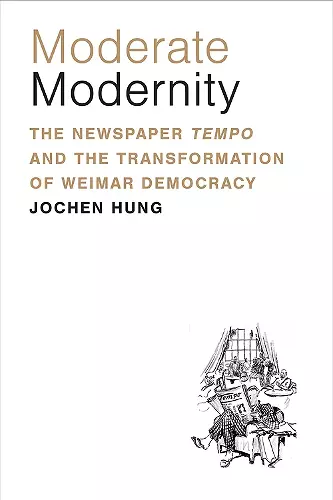Moderate Modernity
The Newspaper Tempo and the Transformation of Weimar Democracy
Format:Hardback
Publisher:The University of Michigan Press
Published:6th Feb '23
Should be back in stock very soon

Focusing on the fate of a Berlin-based newspaper during the 1920s and 1930s, Moderate Modernity: The Newspaper Tempo and the Transformation of Weimar Democracy chronicles the transformation of a vibrant and liberal society into an oppressive and authoritarian dictatorship. Tempo proclaimed itself as “Germany’s most modern newspaper” and attempted to capture the spirit of Weimar Berlin, giving a voice to a forward-looking generation that had grown up under the Weimar Republic’s new democratic order. The newspaper celebrated modern technology, spectator sports, and American consumer products, constructing an optimistic vision of Germany’s future as a liberal consumer society anchored in Western values.
The newspaper’s idea of a modern, democratic Germany was undermined by the political and economic crises that hit Germany at the beginning of the 1930s. The way the newspaper described German democracy changed under these pressures. Flappers, American fridges, and modern music—the things that Tempo had once marshalled as representatives of a German future—were now rejected by the newspaper as emblems of a bygone age. The changes in Tempo’s vision of Germany’s future show that descriptions of Weimar politics as a standoff between upright democrats and rabid extremists do not do justice to the historical complexity of the period. Rather, we need to accept the Nazis as a lethal product of a German democracy itself. The history of Tempo teaches us how liberal democracies can create and nurture their own worst enemies.
"An engaging, concisely written, and well-organized study. . . . Highly recommended."
* J.T. Rasel, Choice *"Jochen Hung uses Tempo to provide an illuminating microhistory of Weimar’s upbeat. . . Hung’s richly illustrated and expertly argued book explores ‘nowadays’ and their passing, when ‘postwar’ gave way to ‘prewar’, and tempo became signal."
* Peter Fritzsche, German History *"A creative and very readable book. . . . One of the many strengths of this volume is that it illustrates transformation processes using examples from the history of the everyday. From the advice of the newspaper's agony aunt to travel tips for singles and the inexpensive organisation of leisure activities at the weekend, Hung focuses on the interaction between Tempo and its readership. In doing so, he provides insights into an Alltagskultur (everyday culture) that had thoroughly positive connotations. He shows, almost casually, how citizens negotiated the big questions of life and work in a new republican state on a small scale." [translated from German]
* Nadine Rossol, Zeitschrift für Geschichtswissenschaft *“einer längst überfälligen und dabei profunden, fest in den historischen Kontexten verwurzelten Studie zu dieser Pioniertat des Printjournalismus. (a long overdue and profound study of this pioneering achievement in print journalism, firmly rooted in its historical context)."
* Patrick Rössler, Jahrbuch für Kommunikationsgeschichte *"Jochen Hung’s engaging monograph is an important addition to the scholarship on modernity, media, democracy, and the late Weimar Republic."
* Jennifer Lynn, Central European HistoISBN: 9780472133321
Dimensions: unknown
Weight: unknown
274 pages